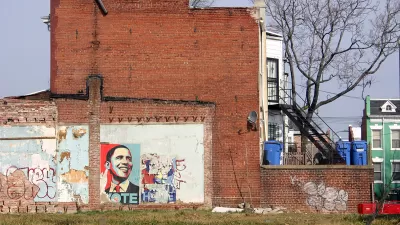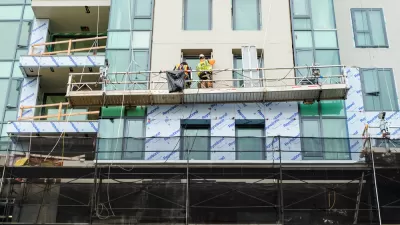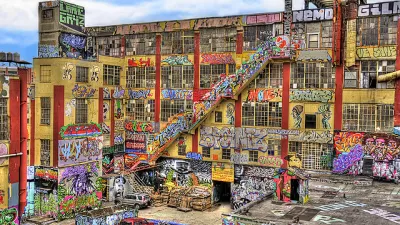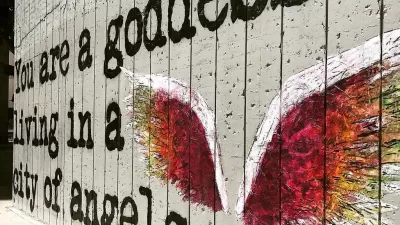After billionaire landlord Dan Gilbert commissioned a mural, less-legal works in Fairey's style began showing up around the city. Detroit's case against the artist brings gentrification's ironies into focus.

Detroit has moved to prosecute Shepard Fairey, the street artist behind "the much-imitated 'Hope' poster that came to symbolize Barack Obama's 2008 presidential campaign, and the 'Obey' series that features the enigmatic face of the wrestler Andre the Giant."
Invited to the city by Quicken Loans founder Dan Gilbert, Fairey "may not have been willing to color entirely within the lines. When he came to Detroit to do the job, several other works in his signature style showed up wheat-pasted around town [...] Now the city is prosecuting the artist on felony charges of malicious destruction of property, claiming that he caused as much as $30,000 in damage."
Fairey's arrest evokes a certain irony. Gentrifying developers "want neighborhoods to be 'colorful' and 'edgy,' with exciting 'street culture' that draws younger consumers to spend dollars in cafes and bars and boutiques—and ultimately to settle down in pricy loft-style apartments, fattening the tax rolls."
But a disconnect remains between "municipal dreams of a city where artists drive economic growth in an orderly, controlled way, and the reality of how artists see the world—or how they want to be seen." Is street art okay in a city like Detroit? Does graffiti attract the "wrong" people—or the right ones? These questions remain unanswered.
FULL STORY: The Mainstream Appeal of Outlaw Street Art

Planetizen Federal Action Tracker
A weekly monitor of how Trump’s orders and actions are impacting planners and planning in America.

Congressman Proposes Bill to Rename DC Metro “Trump Train”
The Make Autorail Great Again Act would withhold federal funding to the system until the Washington Metropolitan Area Transit Authority (WMATA), rebrands as the Washington Metropolitan Authority for Greater Access (WMAGA).

The Simple Legislative Tool Transforming Vacant Downtowns
In California, Michigan and Georgia, an easy win is bringing dollars — and delight — back to city centers.

The States Losing Rural Delivery Rooms at an Alarming Pace
In some states, as few as 9% of rural hospitals still deliver babies. As a result, rising pre-term births, no adequate pre-term care and harrowing close calls are a growing reality.

The Small South Asian Republic Going all in on EVs
Thanks to one simple policy change less than five years ago, 65% of new cars in this Himalayan country are now electric.

DC Backpedals on Bike Lane Protection, Swaps Barriers for Paint
Citing aesthetic concerns, the city is removing the concrete barriers and flexposts that once separated Arizona Avenue cyclists from motor vehicles.
Urban Design for Planners 1: Software Tools
This six-course series explores essential urban design concepts using open source software and equips planners with the tools they need to participate fully in the urban design process.
Planning for Universal Design
Learn the tools for implementing Universal Design in planning regulations.
Smith Gee Studio
City of Charlotte
City of Camden Redevelopment Agency
City of Astoria
Transportation Research & Education Center (TREC) at Portland State University
US High Speed Rail Association
City of Camden Redevelopment Agency
Municipality of Princeton (NJ)





























